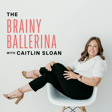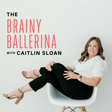
63. What I Wish I Understood as a Young Dancer (+ Special Announcement!)
In this week’s solo episode, I’m reflecting on the most pivotal lessons I wish I had known as a young dancer. From perfectionism to career pivots, I’m sharing the emotional, mental, and practical challenges of transitioning from student to professional dancer + how to thrive through them.
PLUS I have a special announcement - and you’re hearing it here first!
Key “pointes” in this episode:
🩰Why chasing perfection might be doing more harm than good
🩰The surprising power of saying, “I don’t know.”
🩰A mindset shift that could change how you handle judgment and comparison
🩰What I learned after taking a leap from one dance path to another
🩰A new perspective on handling rejection in auditions and casting
🩰The one reminder every dancer needs on their toughest days
✨✨✨ APPLY TO THE CORE CORPS: thebrainyballerina.com/thecorecorps ✨✨✨
Let’s connect!
My WEBSITE: thebrainyballerina.com
INSTAGRAM: instagram.com/thebrainyballerina
1-1 Career Mentoring: book your complimentary career call
Questions/comments? Email me at caitlin@thebrainyballerina.com

